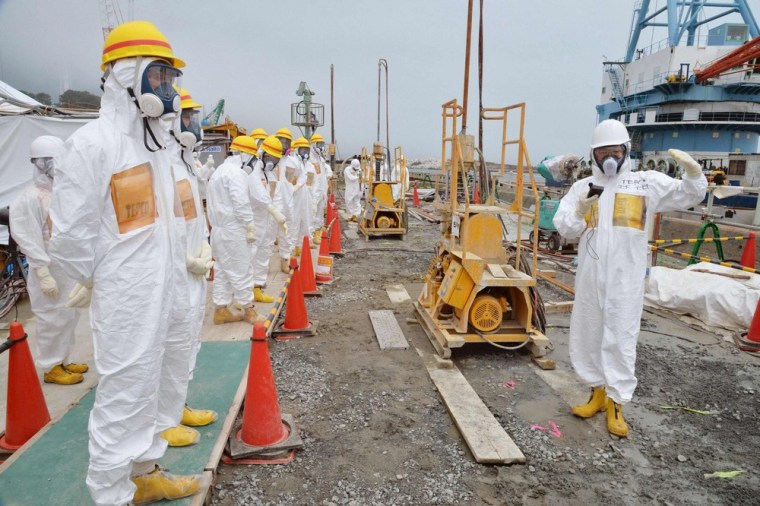The 300 tons of radioactive water leaked to date from a storage tank at the crippled Fukushima nuclear plant in Japan is raising new concerns about the safety of seafood from the region, according to scientists.
Highly contaminated water from the newly reported leak is seeping into the ground, officials with Tokyo Electric Power Company told reporters Tuesday. They do not believe the water has reached the ocean, given the distance of the tank from the harbor. Still, it is likely only a matter of time before it does, said William Burnett, an oceanographer at Florida State University, who studies environmental radioactivity.
The concern is that the radioactive water leaking from the storage tanks will eventually end up in the ocean and contaminate the marine environment, in particular fish that people eat, Burnett told NBC News.
"In general, groundwater does flow downhill and if you go downhill, you wind up in a body of water almost anywhere on Earth," he said.
The new tank rupture is the latest in a string of incidents to raise concerns about radioactive material from the damaged nuclear plant reaching the ocean. Earlier this month, a government official estimated that 330 tons of contaminated water was leaking into the ocean every day from the plant near the reactors (though not all of that water is as radioactive as the contents of the latest storage tank leak).
The plant was crippled when a powerful earthquake and tsunami struck Japan in March 2011.
"We have been saying since 2011 there has been a persistent leak at the site," Ken Buesseler, a senior scientist with the Woods Hole Oceanographic Institute, told NBC News. He has traveled to Japan several times to measure contamination levels.
"When we measure the isotopes in the ocean, we can't say if they are coming from the tanks or from the reactor buildings or some cooling water that was used in 2011, but there has been a measurable release of these isotopes since the very beginning," he said.
The level of contamination has dropped considerably since the earthquake and tsunami, he added, noting that the levels of the isotope cesium 137, for example, are "about 1,000 times less" in 2013 than they were in 2011.
However, he said, the makeup of the isotopes has changed. Cesium 137 is being removed from the water in the storage tanks but in its absence, the water is becoming increasingly enriched in strontium 90, an isotope that is absorbed by the body differently than cesium.
In particular, strontium 90 is bone-seeking; that is, it replaces calcium in the bones and can remain in the fish for longer periods than cesium 137, which "goes in and out of fish and our bodies quite quickly," Buesseler said.
"Strontium can be retained in fish bones — and our bones if we eat the fish — for a longer period of time and so that becomes a different health hazard of concern."
Data on the concentration of isotopes in the water leaking from the storage tanks in unavailable. Time and further monitoring will help illustrate the threat to the marine environment and human health, he said.
For now, "the levels (of radioactive material) have not been high enough to cause direct mutations or mortality," Buesseler said, but added that the radioisotopes do accumulate and "if we consume seafood that is grown in these contaminated waters, then there is a slight increase in cancer risk."
Fisheries around the Fukushima nuclear plant are currently closed and, as far as Buesseler is aware, fish from the area have not shown up in local fish markets or been exported.
What's more, a recent study in the Proceedings of the National Academy of Sciences found that bluefin tuna spawned in waters near the damaged Fukushima nuclear plant and caught in San Diego contain levels of radioactivity that are far below those that are considered a health risk.
"I'm not concerned about the people on (the U.S. Pacific) coast," Buesseler said. "I am concerned for Japan with this continued leakage, especially if the isotope character changes and it becomes a strontium problem."
Nor is he optimistic the problem will be resolved in the near future. "There are a lot of tanks there with a design that seems to be leaking (as well as) the reactors and buildings themselves — that is very difficult to change."
John Roach is a contributing writer for NBC News. To learn more about him, visit his website.
